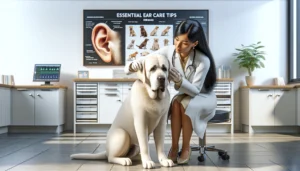Caring for your dog’s eyes is important for his overall health and happiness. Dogs, like humans, rely heavily on vision to understand and connect with the world around them. As a responsible pet owner, it’s important to know how to keep your dog’s eyes healthy, how to recognize signs of potential problems, and how to deal with them. This article describes the most important parts of eye care for dogs and gives you all the information you need to keep your furry friend’s eyes healthy.
1. How to Care for Your Dog’s Eyes:
Dogs can have many eye health problems. Some of these problems are similar to those in humans, while others only occur in dogs. To keep your dog’s eyes healthy, you need to know how they fit together and how to tell when there might be a problem. The nictitating membrane is a dog’s third eyelid that provides extra protection and keeps the eyes moist. By paying close attention to this part of your dog’s eye, you can often spot a problem before it gets worse.
2. Common Eye Problems in Dogs:
There are common eye problems that dogs can develop, such as:
Conjunctivitis: Conjunctivitis, also known as ‘pink eye’, is an inflammation of the conjunctiva. Allergies, illness, or foreign objects in the eye are possible causes.
Cataracts: Just like humans, dogs can develop cataracts, which can blur their vision or even cause them to lose their vision.
Glaucoma: Glaucoma is a disease that increases pressure in the eye and, if left untreated, can cause damage and eventually blindness.
Dry Eye (Keratoconjunctivitis Sicca): A condition in which the eyes do not produce enough tears, which can cause the eyes to feel dry and inflamed and even lead to vision problems.
Corneal Ulcers: These are open sores in the eye, usually caused by injury or infection. They are extremely painful and require immediate treatment.
Catching the signs of these conditions early can prevent them from getting worse. Some symptoms include redness, discharge, tearing, cloudiness, squinting, and changes you may see in the color or size of your eyes.
3. Regular Check-Ups and Preventive Care:
Preventive care is important to keep your dog’s eyes healthy. It is important to have regular checkups with your doctor, including eye exams. Your vet can spot early signs of eye problems and begin treatment before they worsen during these trips. In addition, making sure your dog gets regular checkups and vaccinations can help prevent him from developing diseases that can cause eye problems.
4. Home Eye Care Routine:
There are many ways you can protect your dog’s eyes at home:
Clean Your Eyes Every Day: Use a soft, damp cloth to gently wipe away any dirt and discharge around your dog’s eyes. Be careful not to touch the eyes.
Cutting Hair: For long-haired dogs, cut the hair around the eyes so that it does not irritate the eyes.
Environmental Safety: Make sure your home is free of sharp objects or chemicals that could damage your dog’s eyes.
5. Nutrition’s Role in Eye Health:
To keep your dog’s eyes healthy, he needs to eat right. Eating foods rich in antioxidants, vitamins and minerals can help keep your eyes healthy. The Omega-3 fatty acids in fish oil are very good for your eyes. You should discuss with your vet which foods are best for your dog’s overall health, especially his eyes.
6. The Impact of Breed on Eye Health:
Both a dog’s genes and breed have a significant impact on his risk of developing eye issues. Certain eye problems are more common in certain dog breeds. Dogs such as pit bulls and Shih Tzus often suffer from dry eyes, while Siberian Huskies may be more prone to cataracts. Understanding the risks associated with your dog’s breed can help you take steps to protect and improve his eye health.
7. Treat Eye Emergencies:
Eye problems require immediate treatment. If your dog becomes injured, suddenly becomes blind, is in severe pain, or is prone to swelling, he or she should consult a veterinarian immediately. In eye-to-eye situations, staying calm and acting quickly can make a big difference in the outcome of the case.
8. Lifelong Eye Care:
Some dogs need to keep their eye health under control for the rest of their lives, especially if they have a long-term condition such as glaucoma or ulcers that keep coming back. These dogs must adhere to their treatment plan, which may include regular medications, checkups and even surgery, to maintain their quality of life.
9. Educating Yourself and Your Family:
Educating yourself is a great way to keep your dog’s eyes healthy. You need to know how to properly clean and care for your dog’s eyes and the importance of taking your dog to the vet regularly. Teaching children and other family members how to handle dogs safely and gently can also prevent eye injuries.
Conclusion:
A dog’s eyes are an important part of his sensory system, and keeping them healthy is important for a long, happy life. With regular visits to the vet, good nutrition, and careful care at home, eye problems can be avoided or controlled, and your dog can maintain optimal vision. Knowing how to recognize signs of eye problems and what to do about them will keep your canine friend’s vision and health safe for years to come.
FAQs:
1. What are the most common eye problems in dogs?
Dogs often suffer from eye problems such as conjunctivitis (pink eye), cataracts, glaucoma, dry eyes (keratoconjunctivitis sicca), and corneal ulcers. Some of these symptoms include redness, discharge, cloudiness, staring, and frequent rubbing of the eyes.
2. How often should I look my dog in the eye?
Check your dog’s eyes regularly (at least once a week is ideal) for signs of redness, discharge, or changes in appearance. If you notice any problems or signs of pain in your dog’s eyes, take him to the vet immediately.
3. Can what my dog eats affect his eye health?
Yes, what your dog eats has a major impact on his eye health. Omega-3 fatty acids in fish oil, antioxidants, vitamins A and C, and other nutrients are particularly beneficial for eye health. A healthy, balanced diet can help keep your eyes healthy and improve your overall health.
4. What should I do if I think my dog’s eye is injured?
If you think your dog has an eye problem, you should consult your veterinarian immediately. Early detection and treatment are important to prevent the problem from worsening and can help your dog preserve his vision. Do not attempt to treat this condition yourself, as improper care can worsen the situation.
5. Are certain dog breeds more likely to have eye problems?
Yes, certain dog types are more prone to certain eye problems due to genetics. Dogs with protruding eyes, such as pugs and pit bulls, are more likely to have dry eyes and ulcers. On the other hand, Siberian huskies and Labrador Retrievers may be more susceptible to cataracts. Understand the risks associated with their breed and pay close attention to their eye health.


